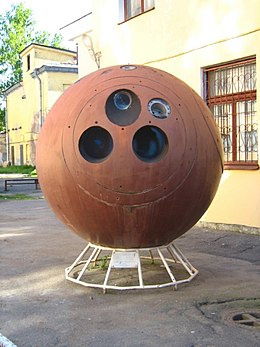|
Kosmos 48
Kosmos 48 (Russian: Космос 48, romanized: Cosmos 48), also referred to as Zenit-2 No.23, was a Soviet, first generation, low resolution, optical film-return reconnaissance satellite launched in 1964. A Zenit-2 spacecraft, Kosmos 48 was the twenty-third of eighty-one such satellites to be launched[3] and had a mass of 4,730 kilograms (10,430 lb). Kosmos 48 was launched by a Vostok-2 rocket, serial number R15002-01,[4] flying from Site 31/6 at the Baikonur Cosmodrome. The launch took place at 09:50 GMT on 14 October 1964, and following its successful arrival in orbit the spacecraft received its Kosmos designation; along with the International Designator 1964-066A and the Satellite Catalog Number 00908. Kosmos 48 was operated in a low Earth orbit; on 14 October 1964 it had a perigee of 204 kilometres (127 mi), an apogee of 284 kilometres (176 mi), inclination of 65.1° and an orbital period of 89.4 minutes. Midway through its planned reconnaissance mission, the thermal control system malfunctioned, with the temperature inside the spacecraft's pressurised capsule increasing to 43 °C. As a result of the malfunction, the spacecraft was deorbited two days earlier than planned, on 20 October 1964, six days after launch.[5] The return capsule, containing the cameras and film, was successfully recovered by parachute for recovery by Soviet forces.[6] References
|
||||||||||||||||||||||||||||||||||||||||||||||||||||||||||||||||
Portal di Ensiklopedia Dunia
